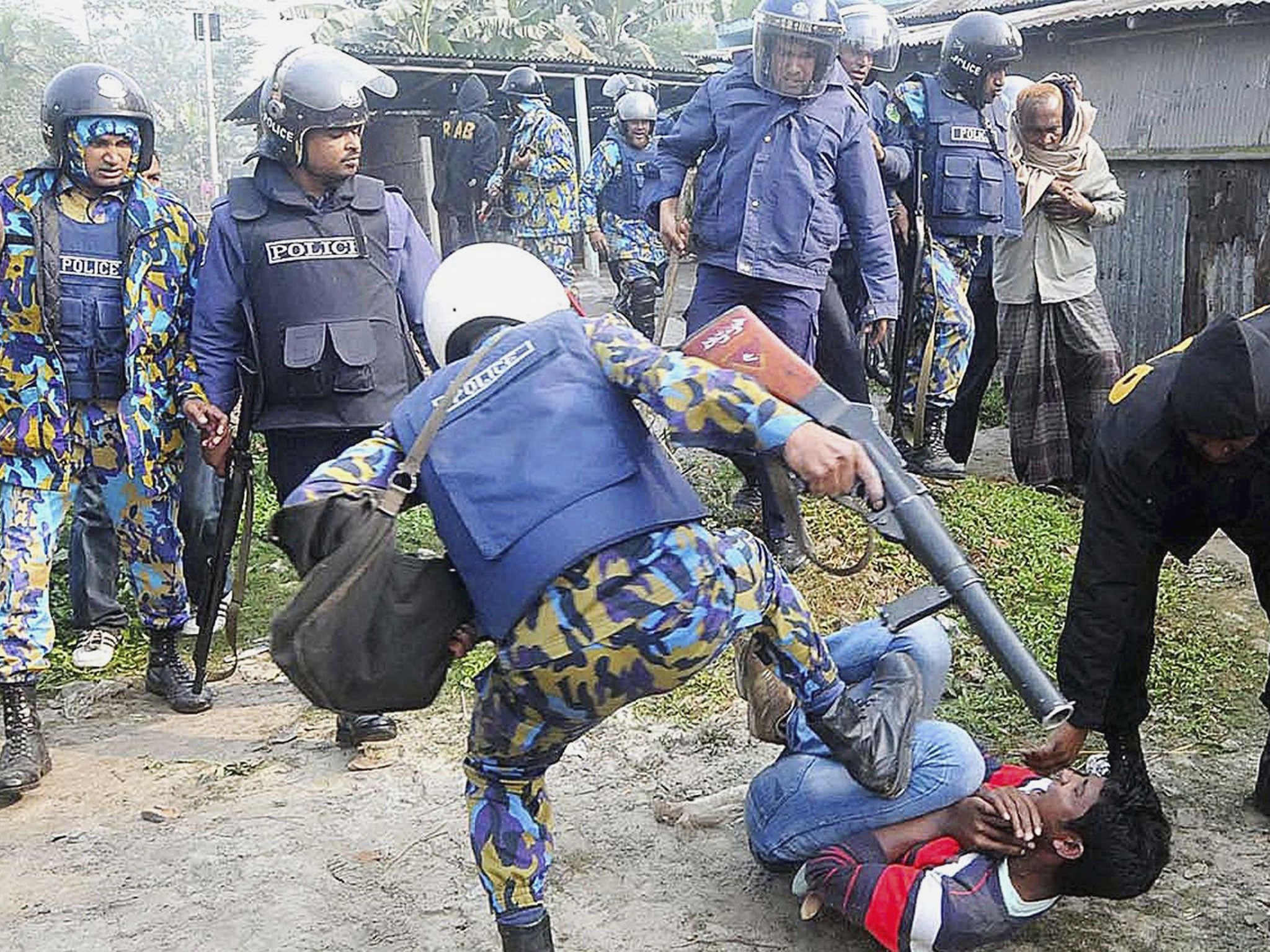At least 21 dead as violence surrounds controversial Bangladeshi election
At least 21 people have been killed in incidents across the country

Your support helps us to tell the story
From reproductive rights to climate change to Big Tech, The Independent is on the ground when the story is developing. Whether it's investigating the financials of Elon Musk's pro-Trump PAC or producing our latest documentary, 'The A Word', which shines a light on the American women fighting for reproductive rights, we know how important it is to parse out the facts from the messaging.
At such a critical moment in US history, we need reporters on the ground. Your donation allows us to keep sending journalists to speak to both sides of the story.
The Independent is trusted by Americans across the entire political spectrum. And unlike many other quality news outlets, we choose not to lock Americans out of our reporting and analysis with paywalls. We believe quality journalism should be available to everyone, paid for by those who can afford it.
Your support makes all the difference.Bangladesh has been rocked by a fresh wave of violence after the country's ruling party pushed ahead and held a controversial election that the main opposition boycotted. At least 21 people have been killed in incidents across the country.
More than a 100 polling stations were set ablaze by opposition activists while police opened fire in various locations on marauding gangs. Such was the concern over the violence that officials suspended voting in at least 390 locations. Turnout appears to have been very low, with perhaps less than 25 per cent of people voting.
"I did not dare to venture outside my complex today. Voting comes later," Khandakar Zoyef, a banker and a resident of the Dhaka 18 constituency, told The Independent. "As far as I know, no one from our apartment building of at least 30 households went out to vote today. Who would risk their lives?"
Despite widespread appeals from both inside and outside Bangladesh, Prime Minister Sheikh Hasina refused to agree to a demand from the opposition parties to appoint a neutral caretaker government to oversee the polls. The EU, US and the Commonwealth, which refused to send observers to take part in the polling, suggested the election be postponed until an agreement could be reached with the opposition.
As a result, a total of 27 political parties, including the Bangladesh Nationalist Party-led opposition alliance, refused to take part. The BNP has called for a 48-hour strike starting from Monday.
"The whole world has seen polling centres without any voters. People have said no to this single-party election and have rejected it," Mirza Fakhrul Islam Alamgir, a BNP leader, said in a statement.
Sunday's violence was just the latest to have played out as the antipathy between the BNP and the Awami League has become increasingly bitter. Around 300 people have lost their lives in political violence since last year. Around 200 of them have died since 25 October when the tenure of the present government officially ended.
The boycott of the election by the BNP and its leader Khaleda Zia, who had been under effective house arrest in the days ahead of the vote, meant Awami League candidates ran unchallenged in more than half of Bangladesh's 300 parliamentary constituencies. Results of the polls are expected to be announced on Monday but the outcome is not in doubt.
Yet what is far from clear is what will happen in the days and weeks ahead. A number of foreign countries had warned Ms Hasina that, unless the BNP took part in the vote, it would be ultimately meaningless and that another election would have to be held. "It is for Bangladesh to run its own national elections process. We want to see sustainable elections that represent the will of the Bangladeshi people," said a spokesperson for the British Foreign Office. As to whether the British government would recognise the outcome of the vote as credible, the spokesperson said: "We will take a view after the election."
The BNP and its allies in the Islamist Jamaat-e-Islami have been involved in clashes with police and Awami League supporters for the past 12 months. The BNP has condemned a series of trials of suspects accused of war crimes during Bangladesh's war of independence.
A number of those convicted and sentenced to death have been senior Jamaat leaders. Last month there were clashes on the streets after the authorities hanged Abdul Quader Mollah, an ally of Pakistan's forces in 1971, who was convicted by a war crimes tribunal of genocide and mass rape.
Observers say it appears Bangladesh is becoming increasingly polarised and that the most likely outcome of Sunday's vote is more violence. "It is a very dangerous situation," said Abbas Faiz, Bangladesh researcher with Amnesty International. "There has been sporadic violence in the past but we have not seen this level."
While the threat of violence was enough to keep many away from the polling booths on Sunday, a number of people decided they wanted no part in a vote they considered unfair. Mohammad Abdul Karim of Faridpur area said, "My neighbours and I decided not to go to the polls today as this is nothing but a game by the government."
Ironically, Bangladesh has been here before. In 1996, the Awami League boycotted an election and only subsequently took part after an agreement was reached to put in place a caretaker government to oversee a subsequent vote. Now, it remains to be seen what international pressure can take place to try and ensure that a fresh election, which both main parties consider fair, is held. That will not be easy.
Join our commenting forum
Join thought-provoking conversations, follow other Independent readers and see their replies
Comments